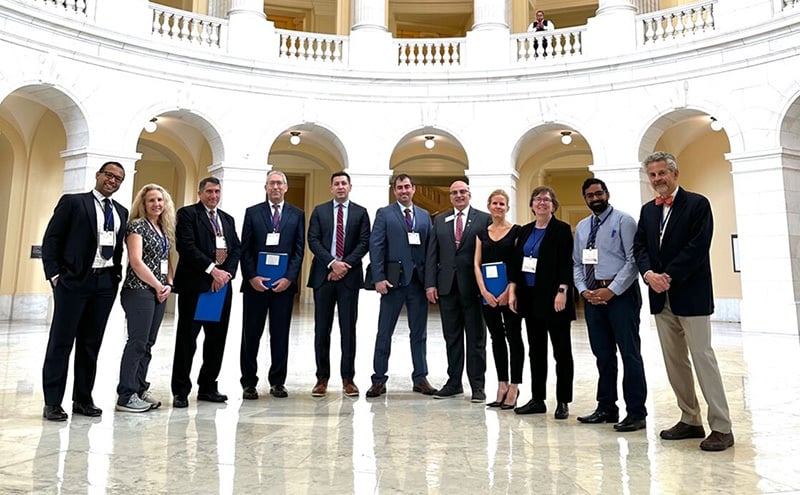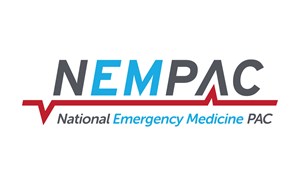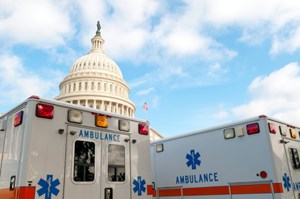
ACEP Leadership & Advocacy Conference 2023 Recap

For a summary of all issues and direct links to the legislative bills, please visit ACEPs Advocacy Action Center here. In the summary below, you will see the title of bills related to each issue under the topic header.
From April 30 – May 2, ACEP’s annual Leadership & Advocacy Conference (LAC) took place in Washington, DC, where over 450 physicians from 42 states attended to help identify and advocate for the legislative priorities of emergency medicine physicians across the country. Attendees held nearly 300 meetings with legislators and staff to discuss three main issues impacting our profession: the ED boarding crisis, ED workplace violence prevention, and ensuring that Medicare physician reimbursements keep pace with inflation. Below, you can find the summary topic briefings given to LAC participants who met with legislators and the specific legislation discussed during the 2023 meeting.
ED Boarding Crisis
S.1346 “Improving Access to Mental Health from the Emergency Department Act”
ED patient boarding, which occurs after a patient has been evaluated, treated and admitted to the appropriate floor but is awaiting an inpatient bed, has escalated into a public health emergency. Overcrowding, long wait times, and compromised care delivery have become prevalent issues in EDs across the country.
- Direct Patient Care Implications: The strain on healthcare providers and resources hampers their ability to respond effectively to emergent medical needs, with consequences that extend beyond the ED, impacting patient outcomes and the overall functioning of healthcare systems. Many physicians have been forced into evaluating patients in waiting rooms, where there exists inadequate privacy, equipment, and space to perform a proper evaluation.
- Health Equity Implications: ED boarding affects patients regardless of their condition, age, insurance coverage, income, or geographic region. However, it disproportionately impacts minority patients and other underserved populations seeking emergency care.
- Workforce Burnout: The boarding crisis has contributed to the burnout of emergency physicians and other ED staff. Many have left the field altogether, further exacerbating the shortage of personnel available to evaluate and treat patients.
- Beyond COVID-19: While the COVID-19 pandemic triggered a sudden increase in boarding severity, ED boarding has been an ongoing problem for decades, largely due to a confluence of systemic issues in our healthcare system, including insufficient access to primary care and misalignment of financial incentives for hospital systems.
- How to Act: Emergency physicians and other advocates are encouraged to call their congressional representatives to demonstrate support for S.1346, the “Improving Access to Mental Health from the Emergency Department Act,” which aims to tackle just one aspect of the boarding crisis.
ED Workplace Violence Prevention
H.R. 2663/ S. 1176 “Workplace Violence Prevention for Health Care and Social Service Workers Act”
H.R. 2584 “Safety form Violence for Healthcare Employees (SAVE) Act”
Workplace violence is an increasingly common and unfortunate reality for many emergency physicians and ED staff. While the COVID-19 pandemic seems to have exacerbated workplace conditions for emergency physicians, longstanding trends already point to a more dangerous and inhospitable working environment.
- Prevalence: Health care workers account for approximately 50% of all victims of workplace violence.
- Concerning Trends: Pre-pandemic, nearly half of emergency physicians reported experiencing physical assault within the past year. Since the COVID-19 pandemic, approximately two-thirds of emergency physicians have reported experiencing physical assault in the past year.
- Impact on Workforce: Workplace violence has contributed to significant workforce shortages in EDs across the country. The additional stress, mental health challenges, and burnout that violence creates for emergency physicians has led some to leave the profession altogether.
- Underreporting: Many incidents go unreported due to fear of professional retaliation or a belief that law enforcement will not follow up on such cases. In addition, unlike similar industries which have received media attention (airline, service, etc.) privacy and compliance standards prevent public exposure to such incidents. Thus, underreporting disrupts efforts to track and address the root causes of violence, perpetuating a cycle of vulnerability for healthcare workers.
- Lack of Federal Standards: Despite the alarming prevalence of workplace violence in healthcare settings, there is currently no federal standard for prevention, tracking, and reporting systems. This regulatory gap makes it challenging to implement consistent and effective measures to ensure the safety of healthcare workers. Urgent action is needed to establish clear guidelines and accountability mechanisms to address this pressing issue.
- How to Act: Contact your congressional representatives to cosponsor two bills aimed at establishing federal standards for ED workplace safety and enforcement – H.R.2663/S.1176, the “Workplace Violence Prevention for Health Care and Social Service Workers Act,” as well as H.R.2584, the “Safety from Violence for Healthcare Employees (SAVE) Act.”
Ensuring Stable and Fair Medicare Physician Payments
H.R. 2474 “Strengthening Medicare for Patients and Providers Act”
For decades, Medicare physician reimbursements have failed to keep pace with inflation, despite Medicare beneficiaries receiving annual inflationary adjustments. Such diminishing reimbursements have had substantial impacts on the healthcare safety net and the ability of our healthcare system to provide emergency care 24/7/365.
- Increasing Pressures on Emergency Physicians: Despite the COVID-19 pandemic and the ongoing ED boarding crisis, Medicare reimbursements have failed to keep pace with inflation over the past several years.
- Pre-Pandemic Trends: Even prior to the COVID-19 pandemic, Medicare payments decreased 53% when compared to inflation (CPI-U index) between 1992 and 2016.
- Impact on Future Workforce: Because of EMTALA, emergency physicians may not opt out of treating Medicare recipients. However, tangible decreases in emergency physician Medicare reimbursements threaten the future pipeline of emergency physicians by decreasing the incentives to pursue this specialty compared to other more stable, financially viable specialties.
- How to Act: Urge Congress to identify policy solutions that will provide long-term stability to Medicare payments and reimbursements for emergency physicians. One such solution is H.R.2474, the bipartisan “Strengthening Medicare for Patients and Providers Act,” which will establish an inflationary update in the Medicare Physician Fee Schedule based on the Medicare Economic Index.
Please consider joining us at next year’s Leadership & Advocacy Conference, which is scheduled for April 14-16, 2024 in Washington, DC. Meanwhile, you can stay updated on state- and federal-level issues by engaging with ACEP’s Advocacy Action Center and the section. You may also support ACEP by contributing to NEMPAC here to amplify the issues that matter most to emergency physicians.
Michael Dorritie D.O.
PGY2 Emergency Medicine – Cook County Health, Chicago, IL
EMRA Representative, Emergency Medicine Practice Management Health Policy Section



